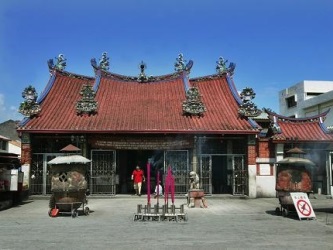Kuan Yin Temple
PenangSentral.com » Penang Tourist Attractions » Kuan Yin Temple
Kuan Yin Temple which is located at Jalan Masjid Kapitan Keling (previously
known as Pitts street), are doubt as one of the oldest Chinese temple in Penang.
With history dated back to 1800, Kuan Yin temple is the symbol of pride,
compassion and love to all her loyal devotees.
The Goddess of Mercy or Kuan Yin is perhaps one of the noticeable figures of all
Buddhist deities in Penang today. She enlightened and embodies the attributes of
benevolence and unshakable loving compassion that is accessible to everyone.
The popularity of Kuan Yin as a beautiful white-robed goddess filled with pure
devotion and compassion are well known to the people of Penang.
Kuan Yin statue is commonly found in homes and Buddhist temples in various
incarnations, often cloaked in white robes. Kuan Yin Temple has become a main
attraction not only to the thousand of Buddhist devotees but also tourist from
all over the world. The temple are built with characteristic of Chinese
architecture and carved with dragon and many mysterious creatures that stood up
and act as the guardian of the temple.
Within the temple, in an inner chamber, is a statue of an 18-armed Kuan Yin with
each hand either containing a different cosmic symbol or expressing a specific
ritual position. In the courtyard are two huge iron stoves where devotees burn
paper offerings (gold and silver paper), an octagonal well which was once a
public well for the Chinese community as well as a comforting sight to view
feeding of flocking pigeons. t is also here that the followers of Hare Krishnan
distribute food free to the homeless, beggars and the hungry irregardless of
their race and religion.
There are several stories regarding Kuan Yin temple, although very little are
documented in official records. For example, it was claimed that during WW2, the
Japanese dropped a bomb on the temple with the intention of destroying it.
Through sheer luck (or divine intervention), the bomb dropped in the courtyard
instead and Kuan Yin temple was left untouched. Others described how a large
number of Penangites took shelter in the Kuan Yin temple during the war.
undo...back